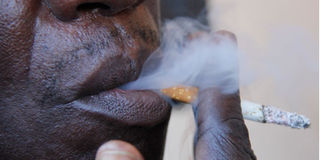Prime
Heal peptic ulcers by changing your lifestyle

A man smokes a cigarette. People who engage in the habit have a high risk of developing ulcers. Photo by Abubaker Lubowa
What you need to know:
Early diagnosis is key in managing ulcers. But health experts say changing lifestyles by avoiding smoking or drinking alcohol can play an important role in reducing a person’s risk of developing the condition.
Every day at 7 am, Tracy Mbogo leaves her home in Entebbe for to Kampala where she runs a shop. To avoid getting caught up in the never-ending traffic on the Kampala-Entebbe highway, she leaves home without having breakfast.
Yet, when she arrives at her work place, Mbogo’s priority is serving her customers, rarely caring about having a meal herself. The 28-year-old says this has been her routine for the past three years.
But early this year, Mbogo started experiencing stomach pain whenever she ate food.
She decided to go to St Margret Hospital, Lweza, where doctors discovered a bacterium was eating up the layer of her large intestines. She was later diagnosed with peptic ulcers.
The doctors at the hospital prescribed medicine that she takes daily to prevent the pain in the stomach.
However, Mbogo says the medication does not always ease the pain, and as a result, she undertakes self-measures such as drinking warm water every morning before eating food.
Expert take
Dr Ivan Kisuule, a general practitioner at Mulago National Referral Hospital, says peptic ulcers are wounds that develop within the stomach lining, causing pain and persistent burning sensation in the stomach
He says there are various types of ulcers that people suffer from, the most common being dyspepsia and gastric (stomach) ulcers.
Dyspepsia is a mild discomfort in the upper belly or abdomen. It occurs during or right after eating, and a person with the condition may feel pain in the area between the navel and the lower part of the breastbone. On the other hand, gastric ulcers occur due to excess gas in the small intestines.
Symptoms
Dr Kisuule says the most common symptom of ulcers is heartburn, which occurs as a result of excess gas in the stomach. Heart burn causes other symptoms such as bloating, belching, vomiting and feeling full before or as soon as a person eats food.
According to him, peptic ulcers are induced by a bacterium called helicobacter pylori, which erode the gastric wall membrane of the stomach. Other causes of peptic ulcers include stress, which leads to the production of excess acid in the stomach, thereby causing wounds.
“When people are stressed, their eating patterns tend to change, with many giving up food. This leads to the production of excess acids, thereby causing ulcers,” explains Dr Kisuule.
Drug-induced ulcers
In some cases, peptic ulcers can result from taking excess amounts of drugs, commonly known non-steroidal anti -inflammatory drugs (NSAIDS). These drugs include diclophenac, aspirin, ibuprofen or naproxen.
Risk factors
Dr Kisuule says people who regularly take alcohol or smoke, and those who are obese have a high risk of developing ulcers.
“Alcohol contains acid used as preservatives. When there is an excess amount of it in the stomach, it creates wounds, which leads to ulcers,” he notes. Pregnancy and respiratory diseases such as asthma, eating foods such as chocolates or those that are high in fat are key predisposing factors for developing ulcers.
That is why once a person is diagnosed with ulcers, Dr Kisuule says, they need to modify their lifestyle and diet.
“People who suffer from ulcers should keep away from alcohol, smoking and taking sugary drinks such as soda as these drinks escalate the production of acid in the stomach,” says Dr Kusuule.
Ulcers take longer to heal among smokers compared to people who do not. He adds: “people who suffer from ulcers should always ensure to eat food at least three hours before they go to sleep in order to avoid heart burn”
Diagnosis
According to Dr Kisuule, ulcers can be diagnosed based on the symptoms that a person may develop.
“Ulcers cannot be diagnosed through an ultra sound scan procedure. That is why it is important that any symptoms of frequent pain in the stomach should be managed as soon as possible,” he notes.
Treatment
One way to manage and treat ulcers is through taking anti-acid medication such as hydroxide and aluminium hydroxide. These drugs work by coating the ulcer and relieving pain, a common symptom for people with the condition. They also help to kill helicobacter pylori, the bacterium that causes the condition.
Anti-histamines can also be taken as they help reduce acid secretion in the stomach.
Dr Kisuule states that peptic ulcers may heal completely, but may recur in some people. This explains why upper gastrointestinal tract endoscopy (UGTE) tests are usually carried out on patients with severe stomach pain and difficulty in swallowing food. The test examines the lining of the eosophagus (the tube that connects the throat to the stomach) and the small intestine.
Complications
Dr Kisuule says if left untreated, ulcers can lead to vomiting of blood (haemorrhage), perforation of the ulcers and difficulty in swallowing. Foods such as matooke and beans worsen the condition, and should therefore be avoided. In general, a balanced, nutritious diet and living a healthy lifestyle is crucial in healing.




